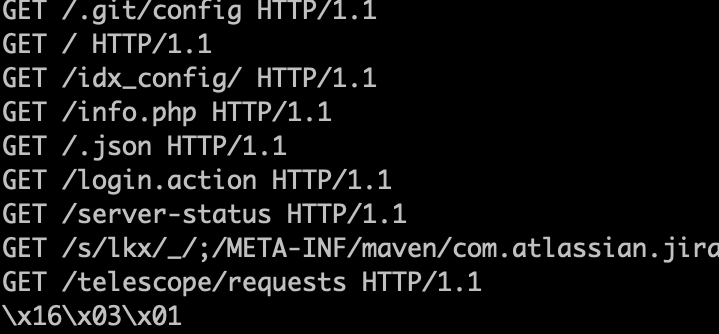l9explore and LeakIX Internet wide recon scans.
Earlier today, I noticed a scan for an odd set of vulnerabilities from
Apache directory traversal issue
GET /cgi-bin/.%2e/%2e%2e/%2e%2e/%2e%2e/%2e%2e/%2e%2e/%2e%2e/%2e%2e/%2e%2e/etc/hosts HTTP/1.1
Looking for secrets/fingerprinting
GET /config.json HTTP/1.1
GET /.DS_Store HTTP/1.1
GET /.env HTTP/1.1
GET /.git/config HTTP/1.1
GET / HTTP/1.1
GET /idx_config/ HTTP/1.1
GET /info.php HTTP/1.1
GET /.json HTTP/1.1
GET /login.action HTTP/1.1
GET /server-status HTTP/1.1
GET /s/lkx/_/;/META-INF/maven/com.atlassian.jira/jira-webapp-dist/pom.properties HTTP/1.1
GET /telescope/requests HTTP/1.1
Connecting to a non-TLS server with TLS
\x16\x03\x01
Based on these URLs, I would call this more "fingerprinting" or "vulnerability discovery" and less so an actual exploit, even though you may argue that this will, of course, set the attacker up for exploits, in particular, if sensitive secrets are leaked in the configuration files. Some of them are oddly specific, like the directory traversal attempt.
So far, I have found three different IPs scanning "the internet" for these URLs:
34.65.197.10 (Google Cloud)
134.122.112.12 (probe-ny001.rand0.leakix.org, Digitalocean)
185.162.235.162 (NovinVPS)
All requests used the same user agent: l9explore/1.2.2. This user agent, like the second IP address in the list above, is associated with the internet scanning platform Leakix. The scanner itself is open source, so possibly the other IPs just run it outside of Leakix. But it maybe a user agent to add to a blocklist to keep the noise down on your systems. Also review that you are not exposing any sensitive information via the URLs listed above. Leakix isn't the only one scanning for them.
IP addresses associated with LeakIX can be found in our "research" feed:
https://isc.sans.edu/api/threatcategory/research/?json. (for all researchers scanning the internet)
https://isc.sans.edu//api/threatlist/leakix?json (just leakix)
---
Johannes B. Ullrich, Ph.D. , Dean of Research, SANS.edu
Twitter|
| Application Security: Securing Web Apps, APIs, and Microservices | Las Vegas | Sep 22nd - Sep 27th 2025 |



Comments